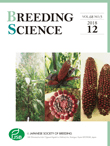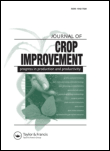
THEORETICAL AND APPLIED GENETICS
metrics 2024
Pioneering research in genetics and biotechnology.
Introduction
THEORETICAL AND APPLIED GENETICS, published by Springer, is a premier journal that has significantly contributed to the fields of Agronomy, Crop Science, Biotechnology, and Genetics since its inception in 1933. With a solid reputation reflected in its Q1 ranking across multiple disciplines for 2023, this journal provides a vital platform for the dissemination of high-quality research that advances our understanding of genetic principles and their applications in agriculture and biology. The journal's indexed status and high impact factor indicate its vital role in shaping contemporary genetic research, marking it as an essential resource for researchers, professionals, and students seeking to stay at the forefront of these dynamic fields. Although it currently does not offer Open Access options, the journal ensures that quality studies are accessible through institutional subscriptions, supporting an informed community of scientists dedicated to innovation in genetics and applied biological sciences.
Metrics 2024
 1.29
1.29 4.40
4.40 5.00
5.00 200
200Metrics History
Rank 2024
Scopus
IF (Web Of Science)
JCI (Web Of Science)
Quartile History
Similar Journals

GENETICS SELECTION EVOLUTION
Shaping the Future of Evolutionary Studies TogetherGENETICS SELECTION EVOLUTION is a prominent open-access journal published by BMC since 1989, situated in the United Kingdom. With a focus on evolutionary genetics and the mechanisms of selection, this journal serves as a pivotal platform for researchers, professionals, and students in the fields of Animal Science, Ecology, and Genetics. Notably, it has achieved remarkable rankings, being categorized in Q1 for various disciplines, reflecting its high impact and contribution to scientific discourse. The journal boasts an impressive recognition in the Scopus rankings, sitting at the 94th percentile in Animal Science and Zoology, and 86th percentile in Ecology and Evolution, underscoring its influence in these domains. Offering open access since its inception, it ensures broad dissemination of knowledge, allowing critical research findings to reach a wider audience. As we converge into its upcoming issues, the journal continues to foster the exploration of innovative genetic research and selection processes, shaping the future of evolutionary studies.

aBIOTECH
Advancing biotechnology for a sustainable future.aBIOTECH, published by SPRINGERNATURE, is a premier academic journal dedicated to advancing the fields of biotechnology, agronomy, and molecular biology. With an impressive ISSN of 2096-6326 and E-ISSN 2662-1738, this journal has established itself as a vital resource for researchers and professionals aiming to publish high-quality, impactful studies. Based in Singapore, aBIOTECH has achieved remarkable recognition, boasting a Q1 ranking in multiple categories including Agronomy and Crop Science, Biochemistry, and Genetics in the 2023 Scopus rankings. Its solid position in the 90th percentile for Biochemistry and Genetics reinforces its significance within the global scientific community. The journal covers a broad spectrum of topics relevant to both basic and applied research, facilitating a shared dialogue amongst scientists and encouraging collaborative progress in innovative biotechnological applications. The open-access nature of the journal ensures that cutting-edge research is freely available, fostering a global exchange of ideas that is critical to the advancement of science today.

G3-Genes Genomes Genetics
Your Gateway to Cutting-Edge Genetic InsightsG3-Genes Genomes Genetics is a prominent open access journal published by Oxford University Press, Inc., dedicated to advancing the field of genetics and genomics. Since its inception in 2011, the journal has become a vital resource for researchers, professionals, and students, featuring high-quality, peer-reviewed articles that cover a broad spectrum of topics within genetics, including clinical genetics and molecular biology. With an impressive standing reflected in its 2023 Scopus rankings, which positions it in the Q2 category for Genetics (Clinical) and Q1 for Medicine (Miscellaneous), G3 remains at the forefront of scholarly communication in these disciplines. The journal's commitment to open access ensures that cutting-edge research is accessible to a global audience, stimulating collaboration and innovation in the field. For those eager to explore the latest in genetic research, G3 serves as an indispensable platform, inviting contributions that push the boundaries of scientific understanding.

GENETICS AND MOLECULAR RESEARCH
Pioneering Research in Genetics and Molecular InteractionsGENETICS AND MOLECULAR RESEARCH is a distinguished academic journal published by FUNPEC-EDITORA, focusing on the rapidly evolving fields of genetics and molecular biology. Since its inception in 2002, the journal has provided a platform for high-quality research and advancements that contribute to our understanding of genetic mechanisms and molecular interactions. With an impressive convergence period extending through 2024, this open-access journal presents vital insights while maintaining accessibility for researchers, professionals, and students alike. Though currently positioned in the Q4 quartile in Genetics, Medicine (Miscellaneous), and Molecular Biology as per the latest 2023 rankings, its persistent publication efforts aim to elevate its influence within the academic community. Researchers are invited to explore groundbreaking studies that may inform future developments in these critical scientific domains.

SILVAE GENETICA
Pioneering research in forestry and genetics.SILVAE GENETICA is a dedicated academic journal in the field of forestry and genetics, published by SCIENDO. Based in Germany, this journal has been a key platform for advancing knowledge in tree genetics and management since its inception. The journal has demonstrated its commitment to quality research with its categorization in the Q3 quartile for Forestry and Q4 for Genetics as of 2023, indicating its relevance and contribution to the respective fields. With an ISSN of 0037-5349 and an E-ISSN of 2509-8934, SILVAE GENETICA covers a diverse range of topics related to the genetic analysis and improvement of forests, employing innovative techniques beneficial for both researchers and practitioners. The journal is indexed within Scopus, ranking #76 in its category for Agricultural and Biological Sciences and #281 for Genetics. While it does not offer Open Access, the importance of the journal's contributions to forestry science and genetic studies cannot be overstated, making it an essential resource for researchers, professionals, and students alike.

Tropical Plant Biology
Connecting Researchers to Tropical BiodiversityTropical Plant Biology is a premier academic journal published by Springer, dedicated to advancing the understanding of tropical plants and their ecological significance. With an ISSN of 1935-9756 and an E-ISSN of 1935-9764, this journal serves as a vital platform for researchers, professionals, and students focused on the fields of Genetics and Plant Science. Notably recognized in 2023 as a Q2 journal in Plant Science and Q3 in Genetics, it ranks 171st out of 516 in Agricultural and Biological Sciences and 227th out of 347 in Genetics according to Scopus. The journal encompasses a diverse range of topics, offering insights into tropical plant biology, ecology, conservation, and biodiversity. Although it does not currently operate under an open-access model, it remains an essential resource for anyone passionate about tropical ecosystems and their intricate relationships. With contributions spanning from 2009 to 2024, Tropical Plant Biology continues to foster scholarly discourse and innovation in the field.

GENOME
Exploring the Depths of Genomic ScienceGENOME is a leading peer-reviewed journal published by Canadian Science Publishing, dedicated to advancing the field of genetics, biotechnology, and molecular biology. With a strong commitment to disseminating high-quality research, GENOME has earned a reputable spot in the academic community, boasting a Q2 classification in Biotechnology and Medicine (miscellaneous), and a Q3 rank in Genetics and Molecular Biology for 2023. The journal, identified by its ISSN 0831-2796 and E-ISSN 1480-3321, publishes innovative studies that span from 1987 to 2024, ensuring a rich historical context while addressing contemporary challenges in the field. Researchers and professionals are encouraged to contribute and engage with content that shapes the landscape of genetic research. Although the journal does not currently provide open access, it remains a vital resource for those committed to the exploration of genomic sciences, making it an essential read for both seasoned researchers and students alike.

Agricultural Science and Practice
Fostering collaboration for a resilient agricultural landscape.Agricultural Science and Practice is a pivotal journal dedicated to advancing knowledge and research in the field of agricultural sciences. Published by the NATIONAL ACADEMY OF AGRARIAN SCIENCES OF UKRAINE, this journal serves as a vital resource for researchers, professionals, and students engaged in agriculture, agronomy, and related disciplines. The journal aims to disseminate high-quality, peer-reviewed articles that address contemporary issues, innovative practices, and advancements in agricultural methodologies. While currently specified as non-open access, the journal endeavors to contribute significantly to the global agricultural knowledge pool while fostering a collaborative research environment. With its base in Kyiv, Ukraine, Agricultural Science and Practice plays an essential role in highlighting regional agricultural challenges and solutions, thereby attracting a diverse readership that aspires to enhance food security and sustainable farming practices worldwide.

BREEDING SCIENCE
Exploring the Intersection of Science and SustainabilityBREEDING SCIENCE is a premier journal published by the Japanese Society of Breeding, dedicated to the advancement of knowledge in the disciplines of agronomy, plant science, and genetics. Established in 1993, this influential publication has consistently contributed to the global research community, showcasing high-quality studies that intersect innovative breeding techniques with pressing agricultural challenges. With an esteemed Scopus rank placing it in the top quartile of Agronomy and Crop Science and the second quartile in Plant Science, BREEDING SCIENCE is essential reading for researchers, professionals, and students alike. The journal's reach and rigor are evidenced by its significant presence in leading academic databases, providing insights and advancements that are critical for improved crop production and sustainable practices. Although it does not currently offer open access options, the depth and relevance of its content ensure that it remains a vital resource for those committed to exploring the evolution and impact of breeding science. For further information, readers are encouraged to connect directly with the journal via its administrative office located at the University of Tokyo's Graduate School of Agricultural and Life Sciences.

Journal of Crop Improvement
Enhancing global food security through rigorous research.The Journal of Crop Improvement, published by Taylor & Francis Inc, is an esteemed platform dedicated to advancing the field of agronomy and crop science. With an ISSN of 1542-7528 and an E-ISSN of 1542-7536, this journal boasts a commendable reputation, reflected in its 2023 quartile rankings—notably, Q2 in Agronomy and Crop Science and Q2 in Plant Science, positioning it among the leading publications within its category. The journal encompasses a wide range of topics related to crop enhancement, sustainable agriculture, and genetic advancements, catering to the needs of researchers, industry professionals, and students alike. Although it currently does not provide open access, the Journal of Crop Improvement plays a crucial role in disseminating pioneering research aimed at improving crop resilience, yield, and quality. By maintaining a focus on innovative studies and empirical findings, the journal supports the global agricultural community in addressing the challenges posed by climate change and food security.